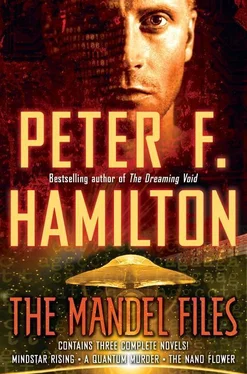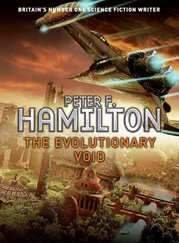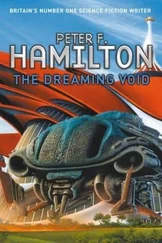What we need is something which will go into a subject’s mind and hunt down the original poisonous memories.”
“Sounds like a job for a psychic,” Greg said.
“It’s an option we’ve considered. In fact it was one reason I was particularly delighted when I was informed you would be coming today. I wanted to quiz you on the parameters of psi. The Home Office said you were one of the best ESP-orientated psychics to emerge from the Mindstar project. Are you able to interpret individual memories?”
“No. Sorry, I’m strictly an empath.”
“I see.” He clasped his hands together and rested his chin on the knuckles. “Do you know of any psychic who can do that?”
“There were a couple in Mindstar who had the kind of ability you’re talking about. They used to be able to lift faces and locations out of a suspect’s thoughts.” He almost said prisoner, but with Stephanie leaning forward in her seat, hanging on to every word, that would never do. He wanted her wholehearted co-operation. “I don’t think they could perform anything like the deep-ranging exploration you require.”
“That’s a pity,” MacLennan said. “I might apply for a licence to practise with a themed neurohormone if one could be developed along those lines.”
“Are you completely stonewalled without psychic analysis?”
“No. There are several avenues we can pursue. Paradigms could be structured to wipe selected memories. A sort of anti-memory, if you like. The major trouble is again one of identification. We need to know a memory in order to wipe it-the nature of it, the section of the brain where it is stored.”
“A real-time brain scan might just tell us,” Stephanie said. “If the subject recounts a particularly traumatic incident it may be possible to locate the specific neurons which house it. The erasure paradigm could then be targeted directly at them. Magic photons, we call it, after the magic bullet; like cancer treatments which kill tumour cells without harming the ordinary cells around it.”
“You would need some very sophisticated sensors to scan a brain that accurately,” Greg pointed out. “Not to mention processing capacity. Part of my psi-assessment tests involved a SQUID scan, but there was no way you could get the focus fine enough to resolve individual neuron cells.”
“Berkeley has allocated us considerable resources,” MacLennan said. His chirpy everything-under-control smile had returned. “We have one SQUID brain scanner already installed here at the Centre. Although, admittedly, its resolution does fall some way short of the requirement Stephanie envisages for the magic photons concept to function. But it is a modest first step. And several medical equipment companies are working on models which offer a higher resolution. I have high hopes for the project.”
“This paradigm research is an expensive venture,” Greg said. “The Board must have a lot of faith in you.”
“They do. I didn’t promise them instant results and success. They fully understand that it is a medium-term project, commercial viability will not be realized for at least another seven to ten years. But they agreed to back it because of the potential. You see, if paradigm-based treatment does work, it will revolutionize the entire penal system. We would have to rebuild our institutions from the ground up. The only people who will actually require detention are petty criminals, everyone else will be reformed in medical facilities.”
“Yeah, I see.” He showed Stephanie a sardonic grin. “I still say you’ll have trouble convincing people to let them out again.”
She shrugged.
“Have you actually tried implanting any of these alternative memories in an inmate?” he asked.
“Indeed we have,” MacLennan said. “Nothing dramatic. It’s early days yet. We are in the process of acquiring baseline data on how well the paradigms are absorbed.” He might have been talking about lab rats for all the emotion in his tone. “The older the subject, the more difficult it becomes, naturally.”
“What about Liam Bursken? Has he been given any synthetic memories?”
“No. He was unwilling to co-operate. At the moment it remains a purely voluntary programme, although we do reward participants with extra privileges.”
“So essentially he is the same person now as he was when he arrived.”
“Yes.”
“Great.” Greg stood up. “I’d like to see him. He should be able to offer me a few insights.”
“As you wish,” MacLennan said. “Stephanie will take you down.”
“Do you have records of the correspondence he’s received?”
Greg asked.
MacLennan glanced enquiringly at Stephanie.
“Yes,” she said. “It’s not much, mostly death threats.”
“I’d like copies, please.”
“I’ll assemble a data package,” MacLennan said. “It’ll be ready for you when you leave.”
“Thanks.” There was always the possibility someone had admired Bursken enough to copy the murder technique. Pretty tenuous, though.
“How has Bursken reacted to the Kitchener murder?” Greg asked Stephanie when they had left MacLennan’s office.
“He’s shown a lot of interest,” she said. “He believes it is a vindication of his own crimes.”
“Oh?”
“According to Bursken, he is one of God’s chosen agents of vengeance in a sinful world. Therefore someone murdering in the same way is proof that God is now instructing them. Therefore, God was instructing him in the first place. QED.”
“What’s he like? I mean, what sort of formative years did he have that could push him into that?”
She hesitated as they walked into the stairwell, her companionability glitched momentarily. Greg was actually allowed to see worry and even confusion.
“The honest truth, Greg, is I haven’t got a clue. We did some research into his background, for all the good it did us. He had a perfectly ordinary childhood. There was some bullying at school, nothing excessive. We could find no evidence of any sexual or mental abuse, no deprivation. Yet even by the standards of this Centre’s inmates, he is completely insane. There is no rational explanation for why he went haywire. We have studied him, naturally; his brain function shows no abnormality, there are no chemical imbalances.
“Currently we’re trying to determine the actual trigger mechanism of his psychosis, whether there is a single cause to send him off on his killing sprees. MacLennan thought that if we could just gain one insight into how Bursken functions we might eventually be able to understand his mentality. That’s why he’s prepared to devote time and money on such a hopeless case. By studying the real deviants, we gain more knowledge of the ordinary. But the results have been very patchy, and completely inconclusive. I doubt we ever will understand. I simply thank God that Bursken is a rogue, very rare.”
“You mean, even your laser paradigm couldn’t cure him?”
“I shouldn’t think so. You see, as far as we can tell, there is no evil memory sequence to replace, no trauma to eradicate. Maybe he did hear voices, who knows?”
The Centre’s interview room was slightly more hospitable than the one at Oakham police station. Greg imagined it had been patterned from a conference room at a two-star hotel, cheap but well meaning. The table was a cream-coloured oval with five comfortable sandy-red chairs around it, almost like a dining room arrangement; certainly the confrontational element was absent. It was on the ground floor and a picture window ran the length of one wall, looking out on the patio garden which filled the building’s central well. Conifers and heathers were growing in raised brick borders, tended by a working party of inmates under the watchful eyes of warders; there were several wooden park benches with inmates sitting and reading, or just soaking up the unexpected bonus of sunlight. They all had a blue stripe on their uniform sleeve.
Читать дальше












